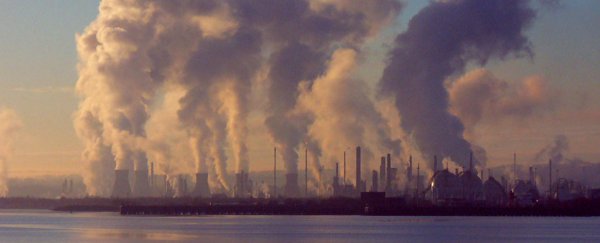World leaders will meet in France in a matter of days to sign a new international agreement on climate change to keep global warming below 2°C. While most of the data they'll discuss is not exactly encouraging, at least one piece of new environmental research provides hope that human action on climate change is having a powerful effect.
After a decade of rapid growth in global CO2 emissions, we've finally hit what looks like a standstill, with emissions stagnating last year despite ongoing growth in the world economy, according to a new report by the European Commission's Joint Research Centre.
Going off the latest estimates, CO2 emissions in 2014 had almost completely stalled, increasing by only 0.5 percent that year compared to the amount in 2013. The stagnation has become pronounced in recent years, after rises of just 1.5 percent in 2013 and 0.8 percent in 2012.
In contrast, global CO2 emissions rose on average about 4 percent over the course of the past decade, so the slow-down is a remarkable achievement. But the scientists who authored the report claim it's too early to say that the apparent levelling off is a statistical trend, pointing out that things are in flux – and that not every country is lowering their emissions.
India in particular stands out in this regard, increasing its emissions by 7.8 percent and becoming the fourth largest emitter globally. Also of concern are new numbers from China, which recently revealed inaccuracies in former figures. This means it's actually been emitting nearly a billion more tonnes of CO2 annually than previously disclosed. (Fortunately, the new report takes the revised data into account.)
It's important to note that the global numbers contained in the report are sourced primarily from reported human-based contributions to carbon emissions such as fossil-fuel combustion and energy generation, and do not include other sources of CO2 emissions including deforestation and logging, forest and peat fires, plus other contributors.
But in terms of the human-based figures, things are looking promising. In 2014 the world's fossil fuel energy consumption decreased, with total CO2 emissions standing at 35.7 billion tonnes. Nearly all of the countries in the European Union (EU) decreased their emissions, as did Japan, Russia, and Australia.
Of the four biggest polluters – China, the US, the EU, and India – which together account for almost two-thirds (61 percent) of global CO2 emissions, the EU was the only one to decrease its emissions, although it's worth noting that the US and China only saw very small increases.
Let's hope this momentum can be retained and channelled into something positive and enduring – a persistent global decrease in CO2 emissions would really be something to celebrate. While nobody's calling what we're seeing here a trend just yet, it's certainly more positive than the figures from most of this century.
"What we do know is that it is very likely that the very high global annual emission growth rates of, on average, 3 percent per year observed in the years 2003 to 2011 are definitely over for many years to come (even 4 percent per year when excluding the global recession years 2008 and 2009)," the authors write, "whereas the average global growth rate over the 1980–2002 period was 1.2 percent per year."
